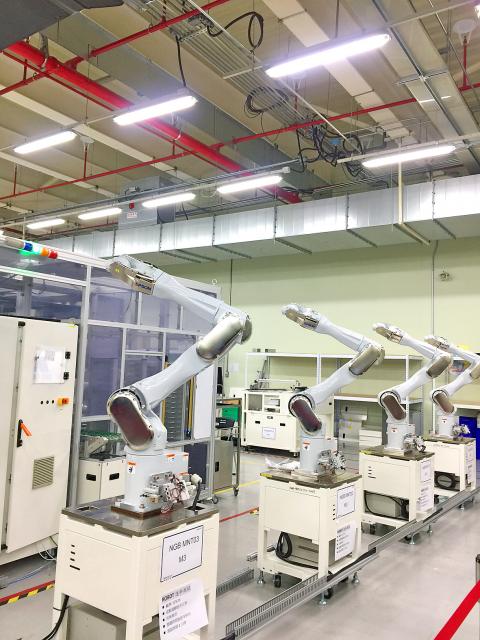Innolux Corp (群創) expects TV assembly to make up 25 percent of its overall TV business revenue this year, thanks to yield improvement and customer gains, a company executive said yesterday.
That would represent a significant increase from last year’s 8 percent contribution and a 1 percent share the previous year, when the company returned to assembling TVs.
The outlook bodes well for the LCD panelmaker as it branches out to new businesses to cope with high volatility in the flat-panel industry.

Photo: Lisa Wang, Taipei Times
The company earlier this year established three wholly owned subsidiaries in Taiwan and China as it prepares to spin off its auto and X-ray machine display businesses.
“We have to assemble TVs to counterbalance” a slump in the flat panel industry, chairman Jim Hung (洪進揚) told reporters at Innolux’s plant in Tainan’s Southern Taiwan Science Park (南部科學工業園), citing the firm’s goal to reshape its business model in three years.
Seeking revenue growth would be high among the company’s priorities and manufacturing TVs would be a major strategy to reach that goal, Hung said.
Innolux said it has grown its customer base in addition to its first client, Sharp Corp, and Vizio Inc to boost revenue growth.
Hon Hai Precision Industry Co (鴻海精密) and Innolux hold a combined 7.24 stake in Vizio, an Irvine, California-based TV vendor.
Innolux’s highly automated production lines and smart manufacturing systems have helped boost yield rate, the company said.
The firm in 2007 set up a two-person task force to develop automated tools and systems, which has since evolved into Innolux’s intelligent integrated automation division group, employing 260 people.
Innolux said it has invested NT$3 billion (US$95.43 million at the current exchange rate) over the past five years into developing automation systems and smart manufacturing solutions, which helped the company reduce staff by 5,000 and cut down manufacturing costs by NT$8.1 billion from 2016 to this year.
Its automated factories, in which robotic arms and machinery operate in the dark, manufacture nearly 90 percent of its notebook computer panels and 80 percent of its mobile phone panels, Innolux said.
The company said it is pitching its smart manufacturing solutions and automation systems to Hon Hai’s subsidiaries, its component suppliers and manufacturers beyond the LCD panel industry.
It has secured orders from up to 10 clients, including two from the nation’s semiconductor industry, Innolux said.
Smart manufacturing solutions and automation equipment could become a major revenue source over time, given that labor and talent shortages have become a bottleneck for Taiwanese manufacturers moving production lines back home to avoid a US-China trade spat, Hung said.
However, the business is still in its infancy, he said.

SEMICONDUCTORS: The German laser and plasma generator company will expand its local services as its specialized offerings support Taiwan’s semiconductor industries Trumpf SE + Co KG, a global leader in supplying laser technology and plasma generators used in chip production, is expanding its investments in Taiwan in an effort to deeply integrate into the global semiconductor supply chain in the pursuit of growth. The company, headquartered in Ditzingen, Germany, has invested significantly in a newly inaugurated regional technical center for plasma generators in Taoyuan, its latest expansion in Taiwan after being engaged in various industries for more than 25 years. The center, the first of its kind Trumpf built outside Germany, aims to serve customers from Taiwan, Japan, Southeast Asia and South Korea,

Gasoline and diesel prices at domestic fuel stations are to fall NT$0.2 per liter this week, down for a second consecutive week, CPC Corp, Taiwan (台灣中油) and Formosa Petrochemical Corp (台塑石化) announced yesterday. Effective today, gasoline prices at CPC and Formosa stations are to drop to NT$26.4, NT$27.9 and NT$29.9 per liter for 92, 95 and 98-octane unleaded gasoline respectively, the companies said in separate statements. The price of premium diesel is to fall to NT$24.8 per liter at CPC stations and NT$24.6 at Formosa pumps, they said. The price adjustments came even as international crude oil prices rose last week, as traders

Taiwan Semiconductor Manufacturing Co (TSMC, 台積電), which supplies advanced chips to Nvidia Corp and Apple Inc, yesterday reported NT$1.046 trillion (US$33.1 billion) in revenue for last quarter, driven by constantly strong demand for artificial intelligence (AI) chips, falling in the upper end of its forecast. Based on TSMC’s financial guidance, revenue would expand about 22 percent sequentially to the range from US$32.2 billion to US$33.4 billion during the final quarter of 2024, it told investors in October last year. Last year in total, revenue jumped 31.61 percent to NT$3.81 trillion, compared with NT$2.89 trillion generated in the year before, according to

PRECEDENTED TIMES: In news that surely does not shock, AI and tech exports drove a banner for exports last year as Taiwan’s economic growth experienced a flood tide Taiwan’s exports delivered a blockbuster finish to last year with last month’s shipments rising at the second-highest pace on record as demand for artificial intelligence (AI) hardware and advanced computing remained strong, the Ministry of Finance said yesterday. Exports surged 43.4 percent from a year earlier to US$62.48 billion last month, extending growth to 26 consecutive months. Imports climbed 14.9 percent to US$43.04 billion, the second-highest monthly level historically, resulting in a trade surplus of US$19.43 billion — more than double that of the year before. Department of Statistics Director-General Beatrice Tsai (蔡美娜) described the performance as “surprisingly outstanding,” forecasting export growth